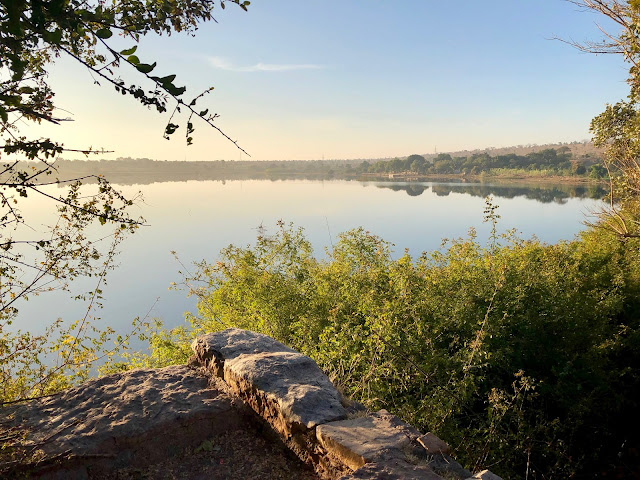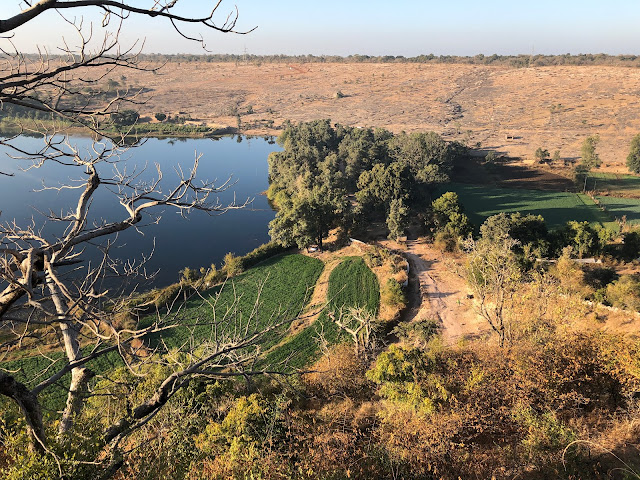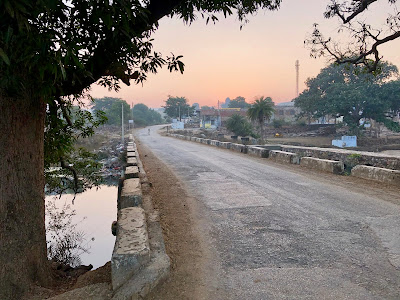9. Camping at Pangarh Lake
Pangarh Lake
The family who own the castle also own the land on the western bank of Pangarh lake and originally used it as a hunting lodge. They have now added luxury tents and use it as an interesting alternative to staying at the castle.We were offered various different means of travelling the 12 kms to get to Pangarh Lake - riding, cycling, jeep or walking. A few of us decided to walk at least as far as the lunch stop en route. It was a really enjoyable amble with KP happily bird spotting along the way. We stopped by another lovely lake where our lunch magically appeared!



Only Louise decided to finish the journey on foot. When we reached the camp our driver leapt out of the jeep and disappeared down the hill. As we approached, there was our driver doubling up as one of the musicians!!
Now there are ten luxury tents with en-suite facilities. We were expecting it to be really cold at night but in fact it was warmer than at the castle.
Rugs on the floor and beautiful material on the ceiling canopy with hot showers en-suite.
Sunrise the next morning
An early morning cup of tea for mutual appreciation of such an early start before we went for a dawn walk up to the ruins of the 1000 year old Fort on the hill opposite.
A view of the fort on top of the hill from the camp.
On our walk up the hill we came across shrines to remember women who had committed sati (or suttee), the Hindu custom where a widow is burnt to death on her husband's pyre, thereby demonstrating their exceptional devotion. A widow's status was seen as an unwanted burden, she was considered unholy and impure and someone to be shunned. By committing sati she became pure and indeed the word "sati" is derived from sanskrit word "asti" which means "she who is pure or true". In hindu mythology Sati was the wife of Lord Shiva but Sati's father despised and never respected Shiva so in protest Sati burned herself and prayed to be reborn as Lord Shiva's wife again. This happened and her reincarnation was called Parvati. People used to justify the practice of sati upon this tale but Sati was not a widow so the story is unrelated. It has never been supported by the scriptures.
The practice dates back to the 3rd century BC, gaining popularity from the 10th Century AD, and became common in northern India particularly in Rajasthan. It was originally confined to widows of kings but became increasingly widespread and moved from being a voluntary act of great devotion to being forced, particularly if she had no children to support her. Many attempts were made to stop the practice - it was banned by the provincial government in 1829 but continued, particularly in rural areas. Queen Victoria made it illegal in the whole of India in 1861.
In 1987 in a village in Rajasthan an 18 year old widow who had only been married for 8 months was drugged and forced to commit sati. The police investigated and several men were arrested. This has lead to the Prevention of Sati Act 1987 making it illegal to force or encourage anyone to commit sati. Yet at least 4 cases of "voluntary" sati have been recorded between 2000 and 2015.
KP explained that these shrines are in memory of those who committed sati and their families still come and spend time there, often making food there and staying the night.
We continued our walk up the hill
KP points out birds and a huge spider's nest in the tree!
The ruins of the old fort
There was a temple at the very top - with the priests mobile phone number on the back wall just in case anyone needed to meet up with him there!
The view from the top was stunning and made it clear just how fertile the land is with water but just stoney desert without.
We had yoga when we got back from our walk in the most amazing yoga studio I have ever used!
Then we had a magical breakfast on a boat on the lake!


























Comments
Post a Comment